Jean-louis Dessalles - Publications [See all papers] - [Selected Papers] - [Talks]
See also Books:
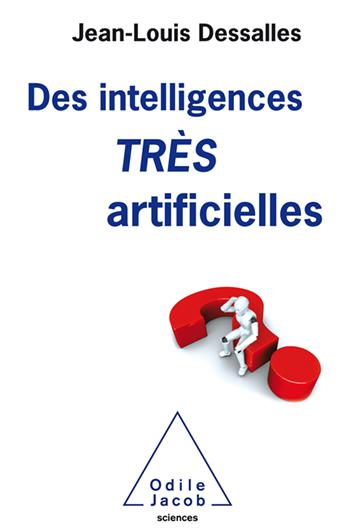

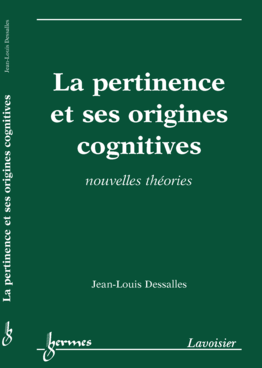
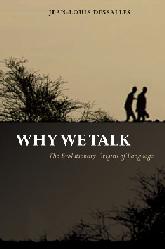

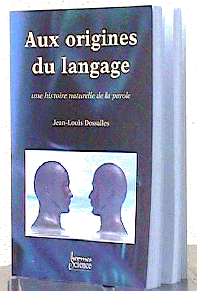

 Topics
Topics
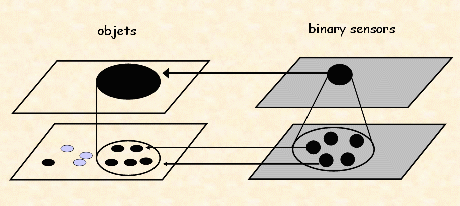 Social signals
Social signals
Evolutionary origins of language
Evolution and information
Simplicity Theory
Cognitive modelling of interest
Cognitive modelling of relevance
Cognitive modelling of meaning
Cognitive modelling of emotional intensity
Cognitive modelling of concept learning
Emergence as complexity drop
Qualia cannot be epiphenomenal
→ [ See all papers ] → [ Selected papers ]
Selected topic: Emergence as complexity drop
| Emergence takes place in an observer’s ‘mind’. The observer needs not be a human.
It is characterized by a sudden complexity drop when considering a collective. Emergence can be studied in human or artificial societies, where individual agents may be aware of patterns emerging at the collective level. |
My 10 papers about EMERGENCE (but see my other papers)
-
Dessalles, J.-L., Ferber, J. & Phan, D. (2008). Emergence in agent based computational social science: conceptual, formal and diagrammatic analysis. In Y. Shyan & A. Yang (Eds.), Intelligent complex adaptive systems, 255-299. IGI Global.
Keywords: EMERGENCE
This chapter provides a critical survey of emergence definitions both from a conceptual and formal standpoint. The notions of downward / backward causation and weak / strong emergence are specially discussed, for application to complex social system with cognitive agents. Particular attention is devoted to the formal definitions introduced by (Müller 2004) and (Bonabeau & Dessalles, 1997), which are operative in multi-agent frameworks and make sense from both cognitive and social point of view. A diagrammatic 4-Quadrant approach, allow us to understanding of complex phenomena along both interior/exterior and individual/collective dimension.
→ Download PDF Share: -
Dessalles, J.-L., Müller, J.-P. & Phan, D. (2007). Emergence in multi-agent systems: conceptual and methodological issues. In F. Amblard & D. Phan (Eds.), Agent-based modelling and simulation in the social and human sciences, 327-355. Oxford: The Bardwell-Press.
Keywords: EMERGENCE
→ Get a PDF version of this paper.
-
Dessalles, J.-L. & Phan, D. (2005). Emergence in multi-agent systems: Cognitive hierarchy, detection, and complexity reduction. In P. Mathieu, B. Beaufils & O. Brandouy (Eds.), Artificial Economics, 147-159. Springer LNEMS 564.
Keywords: EMERGENCE
The present paper provides a formal definition of emergence, operative in multi-agent framework designed by Agent Oriented Programming, and which makes sense from both a cognitive and an economics point of view.
→ Download PDF Share: -
Bonabeau, E. & Dessalles, J.-L. (1997). Detection and emergence. Intellectica, 25 (2), 85-94.
Keywords: EMERGENCE SIMPLICITY
Two different conceptions of emergence are reconciled as two instances of the phenomenon of detection. In the process of comparing these two conceptions, we find that the notions of complexity and detection allow us to form a unified definition of emergence that clearly delineates the role of the observer.
→ Download PDF Share: -
Stewart, J., Dessalles, J.-L. & Fuhs, T. (1996). Du collectif au social - Actes des journées de Rochebrune. Paris: ENST.
Keywords: EMERGENCE
→ Télécharger une version PDF de cet article Share: -
Bonabeau, E., Dessalles, J.-L. & Grumbach, A. (1995). Characterizing emergent phenomena (2): a conceptual framework. Revue Internationale de Systémique, 9 (3), 347-371.
Keywords: EMERGENCE
The lack of a unifying conceptual framework for representing, characterizing and dealing with emergence and emergent phenomena,led us to study the building of such a framework, based on the notions of levels of organization and of levels of detection. Information theory and concepts related to theories of complexity will help us understand the nature of emergent phenomena.
→ Download PDF Share: -
Bonabeau, E., Dessalles, J.-L. & Grumbach, A. (1995). Characterizing emergent phenomena (1): a critical review. Revue Internationale de Systémique, 9 (3), 327-346.
Keywords: EMERGENCE
Emergence seems to be a central concept in Artificial Life, Cognitive Science, and many other related domains, but the meaning of which is not really agreed upon. In this paper, we critically review some major conceptions of emergence and give some examples of phenomena that are usually considered emergent.
→ Download PDF Share: -
Theraulaz, G., Dessalles, J.-L., Fuhs, T. & Stewart, J. (1995). Evolution et organisation: hasard et contraintes dans la genèse des formes collectives - Actes des journées de Rochebrune. Paris: ENST.
Keywords: EMERGENCE
→ Télécharger une version PDF de cet article Share: -
Dessalles, J.-L. (1993). Détection collective. Intelligence collective - Actes des journées de Rochebrune, 21-31. Megève: AFCET.
Keywords: EMERGENCE
→ Télécharger une version PDF de cet article Share: -
Dessalles, J.-L. (1992). Les aspects cognitifs de l’émergence. In B. Amy, J.-J. Ducret & A. Grumbach (Eds.), Actes des journées ‘Emergence dans les modèles de la cognition, 47-59. Paris: ENST.
Keywords: EMERGENCE